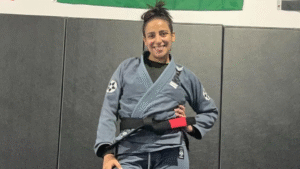
Why women quit jiu-jitsu? If you train this sport, you’ve probably noticed a sad pattern: many women start training, show potential, seem excited… and then, suddenly, they stop showing up at the gym.
There are many reasons why women quit jiu-jitsu, but some are more common than others. Some disappear in the first few weeks. Others after a few months. Some even quit just after buying a gi. It’s as if they vanish without warning.
I’ve witnessed this scene over and over again. It’s especially frustrating when you’re the only woman at the gym. You feel a mix of sadness and loneliness. You wish more women trained. You want female training partners. But they quit. Again and again.
I understand you. I’ve been there too. But have you ever stopped to think: why do so many women give up on jiu-jitsu before really experiencing what this sport has to offer? Let’s talk about the 4 most common reasons why so many women leave jiu-jitsu:
1. Why women quit jiu-jitsu: Lack of emotional support and inclusion
A major reason why women quit is the feeling of not being welcomed. In some gyms, the environment is aggressive, cold, or even hostile. When a woman enters a space dominated by men, she often feels isolated.
Sometimes, she’s treated as fragile or “less capable.” Other times, she’s pressured to prove herself — to be tough, strong, resistant. And there’s no middle ground.
This lack of empathy and inclusion makes many women feel like they don’t belong. That jiu-jitsu isn’t “for them.” That they have to endure, be quiet, and accept it, or leave. And many choose to leave.
✅ Pro tip: Look for gyms with more female students and instructors who genuinely support inclusion.
2. Comparing Yourself to More Experienced Practitioners
Women tend to be very self-critical — and jiu-jitsu puts that to the test. Watching other women (or men) progressing faster, getting stripes, winning rolls, and mastering techniques quickly can lead to a harmful inner dialogue:
“I’m too slow.”
“I’m not good at this.”
“I’m not evolving like I should.”
The feeling of stagnation and frustration leads to insecurity. The student starts thinking she’ll “never be good,” that she’s “too weak,” or even that jiu-jitsu “just isn’t for her.” Little by little, she pulls away from training, until she gives up altogether.
✅ Pro tip: Only compare yourself to who you were yesterday. Focus on your own pace and journey.
3. Mental Load and Lack of Time
Women carry an invisible weight: the mental load. They take care of the house, work, kids, emotional well-being of others, studies, and more. And often still feel guilty for not doing “enough.” Now imagine trying to include jiu-jitsu training in the middle of all that.
The guilt of leaving the kids at home, the feeling of not having time for anything, the tiredness… all of that accumulates. And training, which should be a moment of self-care and mental health, becomes another obligation. So, many women end up giving up, not because they don’t love jiu-jitsu, but because they don’t have the structure to continue.
✅ Pro tip: Make your training time sacred, even if it’s just once or twice a week. It’s your time.
4. Fear of Getting Hurt or Feeling “Not Strong Enough”
The physical contact, intensity, and physical difference between men and women can be intimidating. Many women feel afraid of being injured, especially if they’ve already had a bad experience.
Others are afraid of being seen as “fragile.” They don’t want to be judged, pitied, or blamed for “slowing down the roll.” There’s also internal pressure: to be strong, to endure, to prove something. And this burden tires the body and mind.
When the gym doesn’t have an empathetic environment, or when instructors and classmates don’t respect the woman’s pace, quitting seems like the only option.
✅ Pro tip: Set boundaries. Train with partners who value safety and communicate clearly.
Read more:
– Get to Know Andrezza Façanha Brazilian Jiu-Jitsu Academy
– Behind The Mat: The Abuse and Neglect That Tarnish Our Sport
– Exclusive Interview with Maria Ruffato
Why women quit jiu-jitsu is not always about strength
If you’ve ever thought about quitting jiu-jitsu, know that you’re not alone. Many women go through this. But quitting doesn’t always mean you’ve failed. Sometimes, it means something needs to change:
🔹 Maybe your gym isn’t the right one for you.
🔹 Maybe your routine needs to be more flexible.
🔹 Maybe your goal should be different from your teammate’s.
But above all, you don’t have to give up on yourself. You don’t need to prove anything to anyone.
Jiu-jitsu is a powerful tool for building strength, confidence, and resilience. And you deserve to experience all of that, on your terms, at your pace.
Don’t give up just yet.




